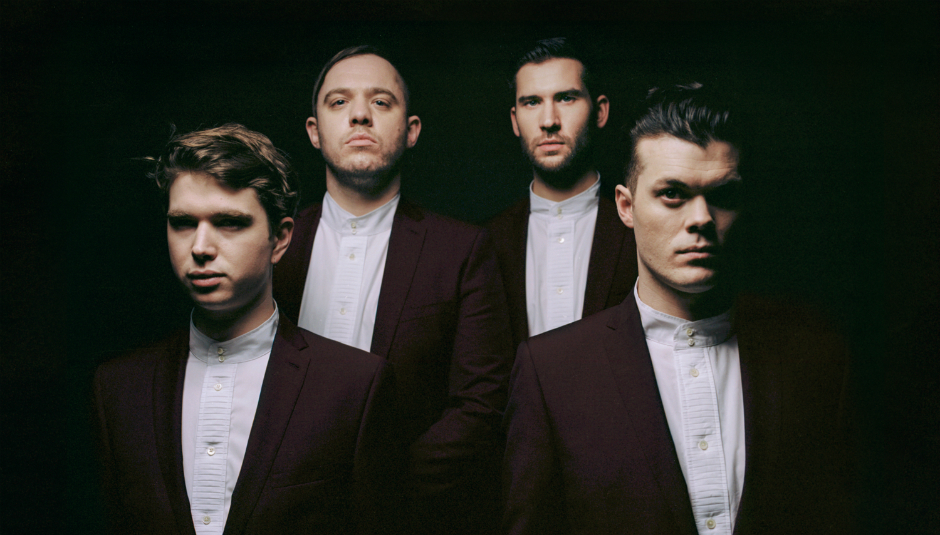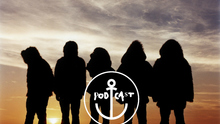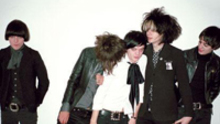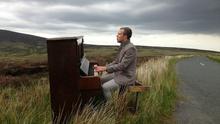Everything Everything are tired and stressed.
When I meet the band at Sony Music’s central London HQ, Jonathan Higgs’ eyes resemble one of the zombies on the Thriller t-shirt he’s wearing. Guitarist Alex Robertshaw isn’t really in the mood for small talk either as he works his way through a mountain of CD inlays and vinyl records that need to be signed for fans. Especially since his manager is convinced that Kanye West will do a surprise release of his new album the same week that Get To Heaven is due out.
“He’s headlining Glastonbury on the Saturday night. Why wouldn’t he do it?”
If you met them right now, I suspect Everything Everything would be in a much better mood. Their third record, Get To Heaven, has been been rapturously received by critics, and rightfully so. It paints the dystopia of modern day living in glistening shades of Technicolour, marrying tales of murder sprees with effervescent riffs and rasping drum beats. It’s a great, big, glorious contradiction that the Mancunian act can be justifiably proud of.
Also, Kanye West has not dropped his new record this week.
Back to the realm of three weeks ago, and both Jonathan and Alex could be probably forgiven for taking a pass at our interview - their last one in a day full of them. Despite this, the duo rouse themselves into enthusiasm and, with a bit of encouragement, give some insightful answers as to the making of Get To Heaven.
Read on for the story of how dance-pop super-producer Stuart Price wanted to can ‘Distant Past’, why the record was almost called Gimme The Gun and the exact number of cats Jonathan owns.
What is the album about?
Jonathan: It is about not being a passenger in life. The feeling you should get from it is to wake up, get out of your chair and confront your demons. Anything that isn’t letting life wash over you and get you down.
When a fan gets one of those signed albums through the door. What do you think they’re going to make of the record?
Alex: Well, it’s the most Everything Everything record we’ve ever done. It’s a bigger and better and bolder version of everything we’ve done before.
But it’s not more of the same, is it?
Alex: When we sat down to make this new record, our goal was to be incredibly energetic. We wanted to make sure the whole record was ‘up’ and exciting and would make people want to move.
When we first did Man Alive a lot of that record was trying to stand out. We were a young band who wanted to stand out above everything else, and sometimes our songwriting got left behind for the sake of bamboozlement. Things that were loud and unruly took centre stage. Listen to ‘Weights’ or ‘Leave The Engine Room’.
Jonathan: In film, there’s a structure that’s used in 99% of them for a very good reason and it’s the same with songs. You mess with that too much and you don’t feel satisfied as a listener, and if you’re too formulaic the same thing happens. So you learn about why these things exist and when to mess with them. What makes a good chorus.
Since you mentioned choruses, ‘Distant Past’ is a song that revolves around its chorus. How did you go about creating that?
Jonathan: It was very off the cuff. I went home to my folks house to record the verse, which was an even more unlikely version in the first place - it was stupid. I thought that was awesome, ‘I’m going to write this funny sort of tune.’
Then I thought, ‘Oh. I suppose it needs a chorus.’
I wrote the chorus and didn’t think anything more of it. Then people latched onto it.
Does that not go against what you were saying though. If the chorus was an almost an accident?
Jonathan: No. It does...
Alex: But when a footballer gets good at kicking a football, do you think he thinks that process through every time?
Jonathan: That’s why it’s taken eight years to learn that. If I’ve read all this at uni and learnt ‘how to write a pop song’ it would be shit.
How much input did Stuart Price have on ‘Distant Past’? He’s a pop producer and that’s the album’s biggest pop song
Jonathan: He didn’t do very much on that one.
Alex: That was one of his least favourites.
Jonathan: He said, ‘Maybe not this one guys.' And he didn’t really change anything. And it turned out to be one of our biggest tunes.
Alex: He was throwing it more into the camp of where we definitely did not want to go. House piano. A big dance thing.
Jonathan: We wanted it to be everything but that, so we made sure we played it on guitars. We made sure there were real drums. All these things which make it a rock song, but we borrowed dance rhythms and the structure.
It’s quite weird to go to a producer and say, ‘We want to sound like a dance act, but not use any elements of that world.’ And him being ‘Mr Dance’ saying, ‘Okay guys. Maybe we can do this….’
You’re a band that that could only exist right now, but all your records are rooted in a deep unease with the modern day world. What do you think of that contradiction?
Jonathan: I think a lot of people living now in a similar way to us, very comfortably, do feel a bit lost and confused about what the world is for. The media paints a negative picture of world events and it’s very easy to get caught up in it, and it’s equally easy to ignore it all. We’re somewhere in between, where we’re all consumed by it, trying to escape it and trying to make it right.
How do you consumer the news? You’ve said to the NME, “If you put out a record this year and it's all smiles, then you're a liar.” I wonder where you got that opinion from.
Jonathan: Well we spent the whole year writing and recording. We didn’t do any touring, didn’t leave home and I watched a lot of rolling news. I got very into certain elements of it, like Alan Henning being beheaded because it was local to us. He was a taxi driver from Stockport, I could have met him. And the fact that someone who did it was also from Britain, but this was being played out on a global scale. It seemed like the craziest thing I’d ever heard.
Obviously, bad news sells but I didn’t want to become desensitised. So I tried to engage with all of it, but there’s so much of it that it does you in.
That’s an extreme thing to do though. To seek out rolling news coverage. Even Twitter is bad enough.
Jonathan: Well Twitter’s bullshit as well. I’m very aware that it’s the media I’m looking at. Not the world.
So when did that first come out in your lyrics?
Jonathan: It wasn’t until I tried to name the thing that I looked through all the lyrics and thought, ‘What is this?’
I was gunning for a really violent title. We nearly called it Gimme The Gun. I was thinking I’ve written all this violence down, there’s no need to put that cherry on it. Let’s try and defeat it with a positive title.
Alex: The lyrics are just one part of it. We get interviews like we are now where we just address the lyrics and sometime people think, ‘Their album’s about the lyrics.’ The whole point is that there’s a contradiction between the way the lyrics are and our sound. It’s a battle.
Jonathan: The music’s positive. Euphoric. And I’m lost amongst it.
So what’s a song on the record where you had to toy with that balance?
Alex: ‘Spring / Sun...’ is a good example of where the music’s very positive and the lyric is very tough. The band’s always enjoyed that Trojan Horse of getting a record onto the radio and there’s a message that cuts a bit deeper.
But, Jonathan, there must be a time when you’ve brought in some lyrics and the band flinched at them?
Jonathan: Yeah that did happen. Not so much with any of the tracks that actually made the album, but it did happen with some of the B-sides.
Alex: There was a song called ‘Pig Dog’ that John wrote, and it just made me feel really awful.
Jonathan: It made me feel awful.
Alex: It’s just like, do we want to make songs that make us feel like us.
You tend to write a lot more about emotions now
Jonathan: Yeah. More and more. When I start I was writing about science and technology and history. A lot of that’s fallen away now and I just want to talk about feelings. They’re not very concise and they’re often contradictory. Or I’m speaking from the point of view of someone I vehemently disagree with in an attempt to understand why these things are happening.
Everyone’s got in the back of their mind, 'Maybe I could do that if I was in the right situation, or the wrong situation.'
How did that approach come out in ‘Regret’?
Jonathan: Very simply. I’ve got regrets, everyone does. It wasn’t a song that I had to write. It was something I used to sing at home with my girlfriend in a very silly way. I think it was something she used to sing, ‘Sitting in the dark.’ One time I turned the lights off and it just became a stupid thing that we did.
When that song comes on Radio 1. How do think someone reacts to it, compared to the new Taylor Swift track? How does it sit in that landscape?
Alex: To be honest, I still don’t know. I still look at the A-list of Radio 1 and it’s a very strange position to be in. We’re very lucky. The reason we seem to be taken on board is because we’re unique I think.
Jonathan: They’ve got a quota.
Alex: If we started writing straight up pop songs like Rihanna they’ve got ten-a-penny of those.
You mentioned you’re unique. You’ve been around for eight years now and I can’t name a band who’ve imitated you. Why is that?
Jonathan: We’ve never been the darlings of anyone.
Alex: When the Sound of 2010 happened it was littered with new, young girl singers. Marina & The Diamonds. Ellie Goulding. Florence. Adele. And a couple of bands who sound like stuff you’ve heard before, but jacked up to 11, like Two Door Cinema Club. Uber indie-pop.
Jonathan: We don’t fit in now and we didn’t then. There are four people in the world who can’t tell you why and we’re two of them.
It seems as though you’ve been quite down on Arc recently. You said to DIY, “There was such a lot of slow songs.”
Jonathan: I think we’re always just down on the last record.
Alex: People keep going, ‘Oh, it’s a depressing one.’ It just had a more mellow tone to it. Maybe we were smoking far more drugs making that record. It’s not depressing, it’s just laid back.
Jonathan: The only stuff we ever regret was when we weren’t ourselves.
Alex: The majority of the time we’re in an uncomfortable place because we chose to be. It’s exciting to meddle with music we shouldn’t.
Jonathan: We enjoy very bad taste sounds like slap bass and midi-trumpet. Things like that are just shit and everyone knows it. I derive a huge amount of pleasure listening to lower than amateur musicians who have no idea what they’re doing. I find that hugely rewarding.
Not just because it’s funny, although it is often hilarious. One in ten people will occasionally hit upon something no musician will ever of thought of, because that isn’t what you do.
There’s a line in ‘No Reptiles’: “Oh baby it's alright, it's alright to feel like a fat child in a pushchair old enough to run. Old enough to fire a gun.”
You must know that people are going to do a double-take when they hear that?
Jonathan: Yeah and I wanted that to happen. We saw Nick Cave a lot in the last year and a lot of his drama comes from the most audacious lines that do have a lot of meaning in, but they’re confrontational and ugly. The same goes with Morrissey. He’ll say things that are slightly absurd, but really good at the same time. Kanye does it as well.
That persona appeals a lot to me at the moment. You’ve got 20 lines, four minutes. How much can you make someone feel like they’ve never felt? How much can you make them think about something they’ve never thought about before?
If Kanye came along tomorrow and said, ‘Make a track for me.' What would you do?’
Jonathan: I think it would be in Alex’s court. Kanye knows enough about cool beats and synths, but he can’t play guitar. We’d just give him the most ludicrously…
Alex: Greensleeves
Jonathan: Baroque. See! Exactly. We were on the same page. It would be a really fast, baroque, layered guitar. We’d know what to do.
Where were you on election night?
Jonathan: At home. Getting drunk.
Alex: I watched it until two or three in the morning and then I kind of gave up.
How does what happened fit in with the record?
Jonathan: Well. Some of the record deals with essentially Farage and the rise of someone who’s a bit dodgy but has stirred up a lot of people. And linking that to pharoahs and men as gods.
I almost feel like it’s not necessary to even talk like this. We never used to have to say what our politics were, but I’m starting to wonder now. You see that election go by and think, ‘Who’s in my country? What is going on?’
And yeah, it’s incredibly depressing and I think things are going to get worse.
I don’t think you have to say what your politics are, but all your records are fundamentally political on a broad level.
Jonathan:Of course. It’s very depressing what’s happened. It’s not the end of the world.
Alex: Had it gone left or right, I don’t think the world’s going to get much better in the next five years. We’re at the whim of slightly bigger things than just our country.
Jonathan: I definitely agree and that’s partly why what I write about is bigger picture than Labour and Tories, which has raged for long enough.
You’ve said, “I just feel like time is running out for the band.” You’ve got to make your mark now. Why?
Jonathan: That feeling comes from the fact that the world is oversaturated with media of any description.
Alex: There’s also that Kings of Leon documentary where the singer says to the band, ‘What are you guys doing? This is your third album. This is the last album. This doesn’t sound like you’re playing on your last album.’
Jonathan: There’s always that hang up, like with most bands, that we don’t know what our future holds. It’s a very fickle industry.
Okay and finally, do you still have four cats Jonathan?
Jonathan: No. I have 11 now.
Seriously?
Jonathan: I did have 11. Then I had 10 and now I have 11 again. I look after them with my girlfriend, and they look after themselves.
Get To Heaven is out now in all good record stores























